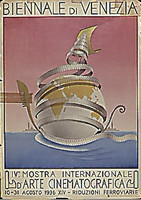Related Research Articles

The Venice Film Festival or Venice International Film Festival is an annual film festival held in Venice, Italy. It is the world's oldest film festival and one of the "Big Five" International film festivals worldwide, which include the Big Three European Film Festivals, alongside the Toronto International Film Festival in Canada and the Sundance Film Festival in the United States. These festivals are internationally renowned for giving creators the artistic freedom to express themselves through film. In 1951, FIAPF formally accredited the festival.

The 3rd annual Venice International Film Festival was held between 10 August and 1 September 1935. This festival saw the introduction of the Coppa Volpi for the acting awards.

The 4th annual Venice International Film Festival was held between 10 and 31 August 1936. This year saw an international jury nominated for the first time.
The 5th annual Venice International Film Festival was held between 10 August and 3 September 1937. The new Palazzo del Cinema building was completed for this year's festival. It has been used as the venue since, excluding the years 1940 to 1948.

The 6th annual Venice International Film Festival was held between 8 and 31 August 1938. The festival screened a French cinema retrospective, spanning works from 1891 to 1933.

The 69th annual Venice International Film Festival, organized by Venice Biennale, took place at Venice Lido from 29 August to 8 September 2012. The festival opened with the Indian director Mira Nair's The Reluctant Fundamentalist, and closed with the Out of Competition film The Man Who Laughs, directed by Jean-Pierre Ameris. Terrence Malick's film To the Wonder was met with both boos and cheers from critics at its premiere.

The 42nd annual Venice International Film Festival was held on 26 August to 6 September 1985.

The 70th annual Venice International Film Festival took place in Venice, Italy from 28 August to 7 September 2013. American film director William Friedkin was presented with a lifetime achievement award. Italian film director Bernardo Bertolucci was the president of the jury. He was previously the president of the jury at the 40th edition in 1983. Gravity, directed by Alfonso Cuarón, was the opening film of the festival. Italian actress Eva Riccobono hosted the opening and closing nights of the festival.
The "10th" annual (void) Venice International Film Festival was held from 30 August to 5 September 1942. The events were hosted at places far away from the Lido and very few countries participated due to World War II and directors that were members of the Rome-Berlin axis. Additionally, a strong fascist political meddling from the Italian fascist government under Benito Mussolini had led to Italy experiencing a period of cultural depression oppressed by fascist propaganda. It is the last edition before the suspension for the Second World War.

The 7th annual Venice International Film Festival was held from 31 August to 15 September 1946. It is the first edition after the suspension, from 1943 to 1945, for the Second World War. This edition is regarded as a second foundation of Venice Film Festival. The prizes for the Best actor and other official prizes were not awarded: The prize for the Best film has lost the name of Mussolini Cup and above were unified into a single premium of the two . This edition marks the return of the films of the United States that were absent since 1939.

The 10th annual Venice International Film Festival was held from 11 August to 1 September 1949. The Venice Film Festival came back permanently to the Palazzo del Cinema on the Venice Lido.

The 11th annual Venice International Film Festival was held from 20 August to 10 September 1950.
The 12th annual Venice International Film Festival was held from 20 August to 10 September 1951.
The 14th annual Venice International Film Festival was held from 20 August to 4 September 1953.
The 29th annual Venice International Film Festival was held from 25 August to 7 September 1968.
The 28th annual Venice International Film Festival was held from 26 August to 8 September 1967.
The 17th annual Venice International Film Festival was held from 28 August to 9 September 1956.

Cardinal Messias is a 1939 Italian historical drama film directed by Goffredo Alessandrini and starring Camillo Pilotto, Enrico Glori and Mario Ferrari. The film was awarded the Mussolini Cup at the 1939 Venice film festival. It portrays the life of Guglielmo Massaia, a nineteenth-century Italian known for his missionary work in the Ethiopian Empire.

The Volpi Cup for Best Actor is the principal award given to actors at the Venice Film Festival and is named in honor of Count Giuseppe Volpi di Misurata, the founder of the Venice Film Festival. The name and number of prizes have been changed several times since their introduction, ranging from two to four awards per edition and sometimes acknowledging both leading and supporting performances.

The 77th annual Venice International Film Festival was held from 2 to 12 September 2020, albeit in a "more restrained format" due to the COVID-19 pandemic.
References
- ↑ "The 1930s" . Retrieved October 8, 2013.
- ↑ "Juries for the 1930s" . Retrieved October 8, 2013.